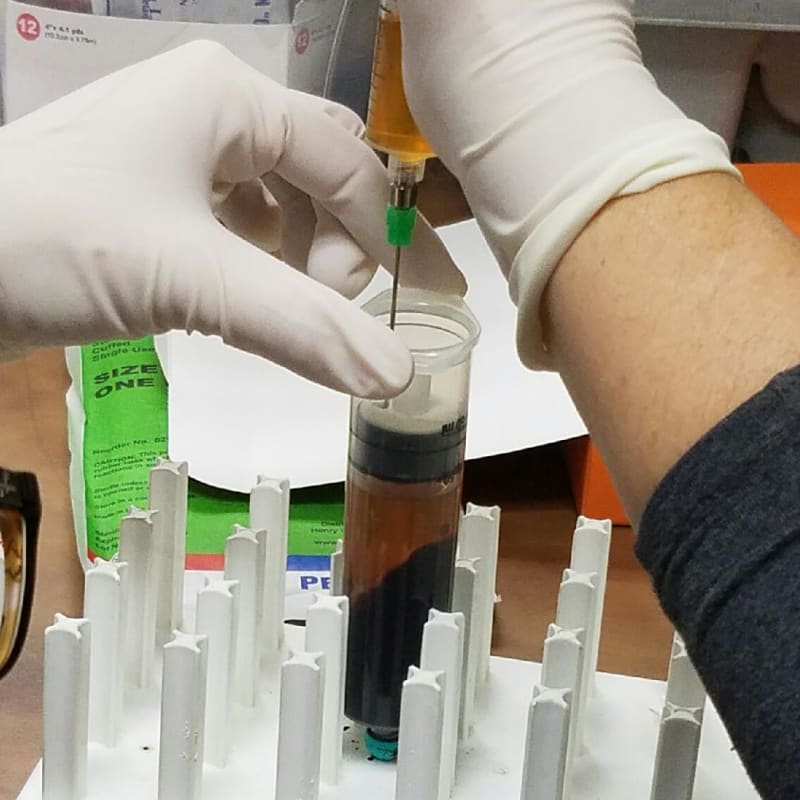Equine Diagnostic Lab
We offer bloodwork and other laboratory testing to inform diagnosis and treatment for our patients. These tests provide a highly detailed understanding of your horse's body.
At Pacific Crest Equine, we have advanced tests to help diagnose your horse's medical issues.
We offer a variety of services, from Coggins testing to blood gas analysis and uterine cultures.
With our diagnostic laboratory, we can efficiently produce data regarding your horse's condition and provide immediate treatment options.

Field Services For Horses
If your horse needs veterinary care at your farm, our veterinarians can come to you with fully equipped trucks, stocked with the technology and tools needed for a diagnosis.

Our Laboratory Services
In addition to the following tests run at our hospital, we collect and process samples to couriered to UC Davis and private laboratories.
- Hematology
Hematological testing is a common and useful diagnostic procedure. A variety of tests may be performed. A complete blood count (CBC) refers to a panel of hematological tests that are commonly used as a health check, before anesthesia.
- Chemistry
A chemistry panel is a collection of 12-20 individual laboratory tests, each of which assess the level of a variety of enzymes and electrolytes. These values provide information about the function and health of kidney, liver, muscle, blood, intestine and other body systems.
- Fibrinogen
Fibrinogen is a very useful test to help diagnose and monitor the response to treatment for a number of pyogenic conditions in foals and yearlings such as Rhodococcus equi and Streptococcus equi.
- Blood Gas Analysis
Arterial blood gas measurements in horses provide information regarding life-sustaining functions of the cardiopulmonary system. It is useful in assessing oxygenation, ventilation, and acid-base status. Blood gas analyses can be easily performed with point-of-care analyzers.
- Cytology
Cytology is a straight-forward and valuable diagnostic technique for the investigation of cellular pathology in smears, washes, abdominocentesis and fine needle aspirations.
- Microbiology
Through regular probiotic testing of your horse's microbiome, we can isolate bacteria and probiotic DNA, sequence the DNA and develop a visualization of the health of your horse's digestion health but further, identify other areas that may need attention and address those as well.
- Parasitology
Horses are born with internal parasites making parasitism one of the most, if not the most, common equine disease. A zero egg count fecal egg count (or parasite) test is a quantitative assessment and identification of how many parasite eggs a horse is shedding at the time of the test. In other words, a fecal egg count test tells you what type and how many parasites are potentially inside your horse’s digestive tract.
- Foal IgG Levels
IgG stands for Immunoglobulin G and gives us an indication of the number of antibodies in the foal's blood that they have absorbed from the mare's colostrum.
IgG testing can tell us if they have absorbed enough antibodies from the mare's colostrum.
- Uterine Cultures
Uterine culture is a common diagnostic test performed on mares to assess uterine health. This diagnostic is often recommended or required before breeding to identify infections that might reduce fertility or, in cases of natural service, infect a stallion.
- Semen Evaluation
Semen evaluation is part of any fertility investigation of a stallion and provides an overall indicator of semen quality. The number of progressively motile sperm (those swimming forward in straight lines) best indicates semen quality and fertilizing capacity.
Poor semen quality could be caused by infection, disease, congenital factors or processing.
Evaluation may also be used in stud management regimes to avoid overuse of a stallion or assess the suitability of a stallion for artificial insemination programs.
- Coggins
A Coggins test – more accurately referred to as an enzyme-linked immunosorbent assay (ELISA) – is a blood test that screens for a potentially fatal disease called Equine Infectious Anemia (EIA).

